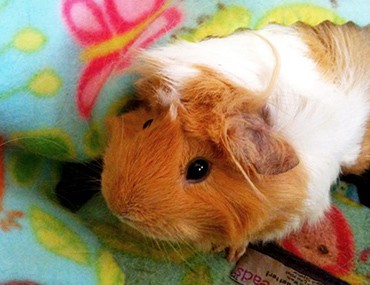
Dr. Laurie Hess is our resident exotics expert and contributes regularly on the Pet Health Network. For more from Dr. Hess, find her on Facebook!
When I tell people I treat rodents, often their initial reaction is, “You treat what?!” I know that at this point, they’re thinking about pesky vermin that get into the trash in your garage or that run through the subway. Somehow, the word “rodent” has a very negative connotation. What most people fail to realize is that many adorable, fuzzy, familiar pets are actually rodents. Here are 5 common rodents that I care for regularly in my exotic animal hospital that have their own unique features and benefits as pets.
Guinea pigs
One of my all-time favorite rodents. Guinea pigs are small, fairly low-maintenance animals that make great first-time pets for families. They don’t require a lot of space, are very responsive to their owners (they actually purr when you pet them!), and can live up to about 8 years with proper care. They do require a great deal of hay to chew on so that they can wear down their continuously growing teeth, some commercial guinea pig pellets, and a small amount of fresh vegetables. They also need a daily vitamin C supplement, since their bodies don’t make vitamin C naturally. They come in different coat colors and lengths and love to interact with their owners and be petted.
Rats
Another terrific pet. Most people don’t think of rats as pets, but talk to any rat owner, and they’ll tell you what phenomenal pets rats can make. Perhaps the smartest rodents, rats can learn tricks, love to hang out with their owners, and are extremely affectionate. They actually respond to their owners when their name is called. They also require a modest sized living space and a simple diet of a good quality rodent pellet plus a small amount of fresh vegetables daily. They come in white, brown, gray, black, and variations of these colors, as well as varying coat lengths (short-haired, long-haired, and hairless). The only down side of rats is that they are short-lived, with most surviving only 2-3 years.
Degus
Very similar to rats. With a body the size of a rat’s and a tail the length of a gerbil’s, degus (also called brush-tailed rats) look kind of like oversized gerbils. Intelligent like their rat cousins, degus are very social and full of personality. They communicate through an extensive vocabulary of sounds and are very active during the day, unlike many other rodents that are nocturnal, making degus more attractive as pets. Degus thrive on a diet very similar to rats’. They are also fairly long-lived, with an average lifespan of 6-8 years but as long as 13 years. They are perhaps one of the less well-known but highly recommended rodents as pets.
Chinchillas
perhaps the cuddliest of all the rodents I treat. Slightly more skittish than some other pet rodents, chinchillas are definitely one of the cutest. With their incredibly soft, fluffy fur, they look more like toys than other rodent species. They live, on average, 8-10 years but have been reported to live as long as 20 years by some breeders. Their tiny noses and whiskers twitch continuously, and they often dart around very fast. They are curious and active and have been known to run for miles in wheels in their cages at night. When grabbed by a predator, they actually escape by releasing a large clump of fur – a defense mechanism called a fur slip. Thus, it’s important to never hold them by their skin. Like guinea pigs, they must chew hay constantly to wear down their ever-growing teeth that can become impacted (like our wisdom teeth) if they don’t frequently chew. Their luxurious fur comes in a variety of colors (black, brown, ivory, beige, and others) that they keep clean and oil-free by rolling around rapidly in bath of finely ground pumice stone – a quite amusing sight that never fails to entertain their owners.
Small Rodents
Hamsters, gerbils, and mice are less demanding than some larger rodents. While these 3 species look different from each other, they are similar in that they generally fit in the palm of your hand and typically require fairly small, multi-level tanks in which to live. These small rodents are low maintenance pets that eat commercial rodent pellets and fresh vegetables daily. They generally live 1-2 years. While some hamsters enjoy being held, other hamsters and many mice and gerbils can be a bit nippy; young children may enjoy them more by watching these active little pets bury themselves in shredded paper, climb through tubes, and zoom up ramps across their cages. Children may also enjoy building paper towel tunnels for them to run through. These animals can make good first pets for kids as long as they have adult supervision for care and handling.
So, next time you hear the word, “rodent,” maybe you will conjure up the image of a fluffy chinchilla or a purring guinea pig. Rodents come in all shapes, colors, and sizes, with varying lifespans. If you’re considering animal you can pet but that doesn’t require a lot of high maintenance care, perhaps a rodent is right for you.
If you have any questions or concerns, you should always visit or call your veterinarian – they are your best resource to ensure the health and well-being of your pets.
The opinions and views expressed in this post are those of the author's and do not necessarily represent the beliefs, policies or positions of PetHealthNetwork.com, IDEXX Laboratories, Inc. or its affiliates and partner companies.
